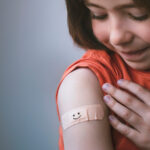The FDA has given the green light to the RSV jab for people aged 60 and over.
The first vaccine against respiratory syncytial virus (RSV) has been approved in the US.
The FDA approved Arexvy (GlaxoSmithKline Biologicals) for people aged 60 and older to prevent the respiratory infection which can cause serious illness in very young children and older adults.
The announcement follows the news last month that the European Medicines Agency has recommended a marketing authorisation of the Arexvy vaccine in the same age group.
GlaxoSmithKline Australia applied to the TGA for approval of the Arexvy vaccine in January.
Dr Nusrat Homaira, a respiratory epidemiologist at Sydney Children’s Hospital, said it was likely the vaccine would become available in Australia.
“It gives us hope, because it is clearly a very bad virus,” said the senior lecturer at the University of NSW.
Dr Homaira said her research indicated that each year in Australia there were around 700 hospitalisations across all age groups due to RSV, but a lack of testing for the virus meant this figure underestimated the true number.
While the burden was highest in the first six months of children’s lives, Dr Homaira said there were “quite a lot” of hospitalisations in people aged 65 and older.
Data from the CDC suggests that each year in the US the virus is responsible for around 60,000-120,000 hospitalisations and 6,000-10,000 deaths in this age group.
The FDA based its approval of the vaccine on an analysis of the first year of data from an ongoing, randomised, placebo-controlled international trial in people aged 60 and older. Participants will remain in the study for two more RSV seasons.
That study compared rates of RSV in 12,500 participants who received Arexvy and 12,500 participants who received a placebo.
The results so far show that a single dose of the vaccine significantly reduced the risk of developing RSV-associated lower respiratory tract disease by 82%, and reduced the risk of developing severe RSV-associated lower respiratory tract disease by 94%.
While RSV is the leading cause of respiratory infections in infants, older people are vulnerable to the virus as well.
RSV can exacerbate underlying chronic conditions in older people with cardiac or respiratory conditions, or those with renal transplant, or on dialysis or chemotherapy.
“Often, the cause of the death will be attributed to underlying chronic conditions, a cardiac arrest, COPD or respiratory failure, but it was actually triggered by that underlying RSV infection,” Dr Homaira said.
Some of the study participants who received Arexvy reported side effects including injection site pain, fatigue, muscle pain, headache and joint stiffness or pain.
The FDA reported adverse effects from two other studies that included around 2500 participants aged 60 and older.
In one study, two participants who were given Arexvy along with an influenza vaccine developed acute disseminated encephalomyelitis, and one of the participants died. And in another study, one participant developed Guillain-Barré syndrome nine days after having the Arexvy vaccine.
It was difficult to estimate the potential population-wide benefits of the vaccine in Australia, as there was a paucity of data on people who become ill but aren’t hospitalised, Dr Homaira said.
“We don’t know what’s happening in the ambulatory or primary care setting where clearly the burden is much higher, because what we see in the hospital is really the tip of the iceberg,” Dr Homaira said.
While the vaccine has not yet been approved for children, Dr Homaira said other treatments were being trialled such as monoclonal antibodies.
“The landscape for RSV therapeutics is going to evolve very rapidly from here onwards, and potentially in the next two to three years we will have multiple preventive therapeutics available.”
Dr Homaira said an RSV vaccine trialled in the 1960s increased the hospitalisation and mortality rate among children. Two toddlers taking part in the vaccine trial died.
“Since then, we haven’t had any vaccine against RSV and all these years of work has come to fruition,” she said.





